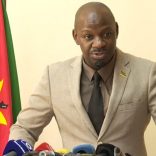Mozambique: UNESCO strengthens sexual education for 30,000 pupils
International Red Cross calls for more security for investments to return to Mozambique

File photo: RTP
The president of the International Committee of the Red Cross has said that he “deplores” the fact that Total, a French multinational, is suspending its activities in in Cabo Delgado, in northern Mozambique, in the wake of the violence there, but recognises that “more will have to happen in terms of security” in the region for investments to return.
“Every investor has options – and, when there are options, security plays a critical role,” the ICRC president, Peter Maurer, said in an interview with Lusa on Monday, the day Total cited reasons of “force majeure” for suspending its natural gas project in Cabo Delgado until security conditions allow it to resume.
On the other hand, in a thinly veiled criticism, Maurer stressed that investment, both among investors and on the part of governments, needs to be more focused on the “people who live in the region where it is carried out” and “less on knowing whether the investment is good or bad”.
Worth around €20 billion, Total’s Cabo Delgado project is the largest ongoing private investment in Africa, yet, as Maurer stated, “we have unfortunately seen too often in the past that investors see their investments as things separate from the populations of the regions in which they are investing.
“I believe that the best recipe for positive investment is really to engage with the local population, to make sure that big international investments are also profitable for the local populations,” the Red Cross boss said.
According to Maurer, who was recently in Pemba, the capital of Cabo Delgado, where he spent a full day talking with people displaced by the violence, “if the local population cannot see the advantage of an investment, unfortunately it often turns into tension, into situations of insecurity, into greater iniquity and inequality.
“I think this is the real problem,” he said, speaking generally but in terms which fit the situation in Cabo Delgado, even if Maurer never expressly made the connection.
“So, on the one hand, I deplore it when a big company like Total declares that it is leaving a context, because positive investment potential is always there,” he said. “But on the other hand, it is also true that a potentially positive investment is only positive if it is not understood and experienced as an exploitation, but as a contribution to local development.”
In this context, the ICRC president said that he also “fears” that, given “a situation such as the one in northern Mozambique today, more will have to happen to attract back investment – in terms of security, but also in terms of the interests of local populations and communities.”
The conflict in Cabo Delgado has been dragging on and increasing in intensity for some three years, but Maurer rejects the suggestion that the international community and organisations such as his own have done nothing.
“I wouldn’t say that nothing has been done,” he said. “We have considerably increased our assistance to the displaced populations. But I agree that it is difficult for us to resolve the issues that are at the root of the conflict.
“I think that, as far as we know, Cabo Delgado has traditionally been a more marginalised province in the Mozambican context,” he went on. “The problems have not had an adequate response. We are also aware that economic interests came into play after the discovery of natural resources off the coast of Mozambique.
“All this has led to increased competition and attention to the strategic situation in northern Mozambique,” he stressed.
Using a sports metaphor, Maurer said that, in face of the fouls committed “in the game”, there have been few if any flags raised until relatively recently, while pointing out that “it’s not just about raising the flag”.
“I would say that a year ago we started to see massive population displacement,” he recalled. “This was the trigger for our engagement with the Mozambican government, for increasing our presence, for opening more offices, for providing more assistance to the public authorities in the north, in trying to respond to health needs, including water and medical care, and aid to the displaced populations.”
Still, he conceded that “from the point of view of preventing the conflict, and of searching for solutions before it causes problems – as has happened in northern Mozambique and in many other places – the international community and states are not really particularly efficient, because conflict prevention implies consistent and long-term investment”.
Meanwhile, the financial constraints that may result from the suspension of investment and any postponement of Total’s operation threaten to worsen the Mozambique government’s budgetary problems, as well as possibly prolonging the conflict, he said.
“We are concerned about the longevity of conflicts and the increasing number of forgotten conflicts, the ones which disappear from the international community’s daily news,” said Maurer. “We see this trend in many places where we operate.”
Whereas two decades ago, he noted, the ICRC would on average maintain its 15 largest operations for a period of 10 to 15 years, now their presence lasts between 25 and 30 years.
“Conflicts have become longer and more difficult,” he lamented.












Leave a Reply
Be the First to Comment!
You must be logged in to post a comment.
You must be logged in to post a comment.